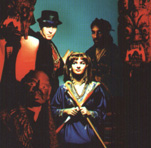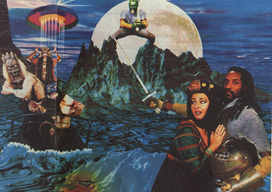


Crossing Frontiers With Transglobal Underground by Bret Miller
This last Fall I was thrilled to speak with the wizards behind the curtain of Transglobal Underground. We met at their hotel the week before they played the Troubadour. The show was incredible, with Natacha Atlas singing to the responsive crowd who were putty in her hands. They played for a too short two hours leaving us wiped out in a good way. I talked to Tim Whelan who plays keyboards, samplers and sequencers and with Hamid Mantu, who played the drums on tour. Both prefer to keep their involvement in TU rather vague with their assumed (?) names and nonchalant demeanor.
Highwire Daze: Tim, what is your contribution to Transglobal Underground?
Tim Whelan: Bits of programming, bits of keyboards, a little bit of guitar, bits of production. Bits.
HD: And Hamid, you do everything too?
Hamid: Bits of programming, bits of production, bits of this, bits of that...
Tim: ...And he does drumming as well. You must remember we don't necessarily credit anyone correctly on the album. We don't even credit ourselves as producers on this album. I think the cult of producers is a bit wankish. We're in the situation where most of what we do gets remixed by somebody else so... the whole idea of a producer being like a film director is out the window. It wasn't a very sensible idea in the first place. Yes, we produced it but...
Hamid: ...We were there...
Tim: We do it, we write it, we put the ideas together and then people come along and fuck them up for us.
HD: You're like the Wizards of Oz?
Tim: Ya, its like this great massive, beautiful, twinkling thing and there's these two dirty old men running it all.
Hamid: We're the nuts and bolts in a way. We just gather the people that we want to come in, whoever's passing at the time and throw them together in this big pot. Sometimes its more worked out.
HD: How did you connect with Musafir?
Tim: We met them up a mountain in Switzerland, we were doing a festival and these guys came on and they were doing traditional music and a bit of fire eating, walking on glass and dancing on their noses and stuff. We thought this was good. We were just running into them in various festivals and slowly this thing developed, a relationship that developed out of a year or two. We kept talking about doing something and eventually that track (Ali Mullah) came out of a festival in Slovenia in Eastern Europe where we did a collaboration on stage and we developed the track from there. We recorded the track not long after Nusrat Fateh Ali Khan died so it certainly made sense.
HD: It's a really intense song and seems to play just long enough to get your juices flowing. Is that how a lot of their music is?
Tim: They can go on a lot longer than that, yes. It depends on what mood they're in. We were working with them live, just before the album came out. I had to run the sequencers live and work around whatever they might be doing and they were trying to work towards what we were doing which was equally hard for them. They've worked with us long enough to understand the technology but you could see them during sound check and a song they've been doing for five years we're suddenly rearranging and throwing things into it without any real explanation. It's two totally different combinations that have no real relation.
Hamid: It's a chance for everyone to stretch out. The second time we did these shows we actually rehearsed with them. The first time we worked out what we were going to do in the sound check. The three dates we did in France and Belgium worked out.
HD: Is there a planned way of putting a track together?
Hamid: We have a start point sometimes, with a backing track. In the case of the track with the Hungarian Gypsies, Rude Buddah, the basic backing track for that was put together about three days before we went out to Hungary. Rude Buddah itself came about through putting some Hungarian samples in to give them something to get a vibe off of. They recorded off the top of that and we processed the whole thing when we got back.
HD: Do you remember the initial events or situations that got you into the music of all these different cultures?
Hamid: I think it was over a period of fifteen years or so, Transglobal was at the end of that period when we all listened to different music from all over the world. We used to be in bands in the ‘80's and when that all finished and we got fed up with guitar, bass, drums and vocals. We then started another band with more world influences in it.
HD: The music of the other cultures got you more excited than what you were living around at the time?
Tim: We were living around half of the other cultures. You've got two aspects, there's the aspect of living in London where you grow up in a massive amount of musical cultures all around you, there all the time, in the background your whole life. On the other hand there's also equally the feeling of trying to reach out to something further, something newer than what you've heard. To rhythms and ideas that don't even exist yet. That's where sampling took off, suddenly you could create some of the sounds that were going off inside your head. You could relate to certain countries on earth but really had little relation to that once you put them together.
HD: I found Rejoice, Rejoice to be a little looser than Psychic Karioke...
Tim: The first album, Dream Of A Thousand Nations, that had a feeling...first of all, we had no idea what we were doing or why we were doing it and Transglobal Underground didn't exist yet, it was just a concept, what the name suggests. With this album we were just trying to get back into that feeling of loosening up and just allowing whatever happened to happen. Psychic Karioke and International Times were close to the very definite line-up of people we were recording with. With this one, as well as the first album, there was no line-up at all. It was just the two of us and Natacha. We wanted to put a band together to do some shows and we were thinking that it was a great group but there was something missing along the way. Live, we have Johnny Kelsey, a drummer from London, an amazing percussionist, we have Coleridge who's been one of our mainstays of the live run-up for quite some time and we then brought on TUUP who's been on every album but hardly ever played live with us. He's been here from the beginning and before the beginning. Suddenly this thing just took off. TUUP got a vibe working off of the various people involved and the whole thing came together brilliantly on stage. We've had a fairly consistent line-up for four or five months now.
Hamid: They've all got other things to do, TUUP's a storyteller, he goes all around the world telling stories, Johnny Kelsey's got the Dhol Foundation and the others have their long term projects. If we were invited back here we may have a different line-up.
Tim: The strength and weakness of the band is all the people involved do have their own strengths and own things going and they do it because they love it not because they need to do it.
HD: Where have you had your largest audience?
Hamid: Our largest audiences are coming up soon. We're doing a Page and Plant tour in Europe. We're actually big in the Czech Republic and Budapest, believe it or not.
HD: How have you been received in the U.S.?
Hamid: The reaction we've been getting live is phenomenal. It's such a new thing.
Tim: To some extent once people see it over here they will start to get a bigger picture of it. From an American point of view it seems to work really well. What we do live seems to work because it's really direct and there's a lot of stuff to see. Actually there's a party going on on stage. In some European countries people get too analytical about these things, they'll stand there scratching their chins. I'd rather play to a small American audience than a big British one. Because people do come over and they're really positive and they'll give you something back. There's a feeling that no matter where we play the people who turn up are enjoying it and having a good time.
If you crave music made with an ear to different cultures from around the world and are ready to dance and open your mind then give Transglobal Underground's Rejoice, Rejoice a listen and let the party begin.
Links
Main Page: Read more of Bret's RamblingsTranslgobal Underground's website: Learn more about this excellent group as well as info about Natacha Atlas.
This page has been visited times.